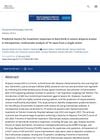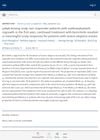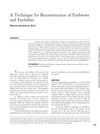TLDR Baricitinib is effective and safe for long-term treatment of severe alopecia areata.
This study evaluated the long-term efficacy and safety of baricitinib, a Janus kinase inhibitor, in treating severe alopecia areata (AA) over 104 weeks. The retrospective analysis included 51 patients, with 36 continuing treatment for the full duration. Results showed that 55.6% of these patients achieved a SALT score of ≤20, and 72.2% experienced a ≥30% improvement in their SALT score from baseline. Key predictors of positive response included female sex and a disease duration of less than 4 years. Additionally, patients who showed eyebrow or eyelash regrowth at 52 weeks were more likely to achieve long-term scalp hair regrowth. The study also identified a subgroup of slow responders who achieved significant improvement between 52 and 104 weeks. Baricitinib was well tolerated, with no serious long-term adverse effects reported, supporting its efficacy and safety for long-term use in severe AA.
 January 2025 in “The Journal of Dermatology”
January 2025 in “The Journal of Dermatology” Certain patient traits can predict better hair regrowth with baricitinib in severe alopecia areata.
 November 2024 in “Journal of the European Academy of Dermatology and Venereology”
November 2024 in “Journal of the European Academy of Dermatology and Venereology” Long-term baricitinib treatment can lead to significant scalp hair regrowth in patients initially showing only eyebrow or eyelash regrowth.
 February 2024 in “Journal of the European Academy of Dermatology and Venereology”
February 2024 in “Journal of the European Academy of Dermatology and Venereology” Baricitinib is effective and safe for long-term use in severe alopecia areata, improving hair regrowth and quality of life with few side effects.
January 2024 in “Acta dermato-venereologica”  1 citations
,
September 2023 in “Dermatology and Therapy”
1 citations
,
September 2023 in “Dermatology and Therapy” Baricitinib helps improve hair growth in severe alopecia, with better results in less severe cases and higher doses working faster.
 September 2023 in “British Journal of Dermatology”
September 2023 in “British Journal of Dermatology” Hair regrowth from severe alopecia areata treatment with baricitinib can vary, with faster results in those with shorter hair loss duration.
 148 citations
,
March 2022 in “The New England Journal of Medicine”
148 citations
,
March 2022 in “The New England Journal of Medicine” Baricitinib was effective in treating alopecia areata in two major trials.
 September 2024 in “Journal of the American Academy of Dermatology”
September 2024 in “Journal of the American Academy of Dermatology” Continued baricitinib treatment leads to significant scalp hair regrowth in severe alopecia areata patients.
 15 citations
,
May 2005 in “Seminars in Plastic Surgery”
15 citations
,
May 2005 in “Seminars in Plastic Surgery” The document concludes that hair follicular unit transplantation is an effective method for eyebrow and eyelash reconstruction, with patients happy despite needing regular trimming.









